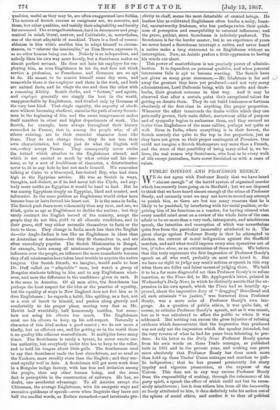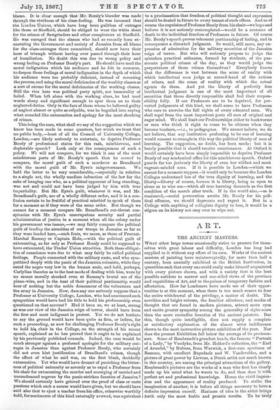PUBLIC OPINION AND PROFESSOR BEESLY.
WE do not agree with Professor Beesly that we have heard " almost enough " of the horrid system of organized murder which has recently been going on in Sheffield ; but we are disposed to think that we have heard almost enough of the crime of Professor Beesly, and earnestly trust we may not have to record any attempt to punish him, as there are but too many rumours that he is likely to be punished, by interfering with his-social position, or de- priving him of his functions as a teacher, for having uttered what every candid mind must on a-review of the whole facts of the case admit to be no more than a very rash, intemperate, and mischievous speech, the intention and conception of which was nevertheless quite free from the particular immorality attributed to it. The great charge against Professor Beesly is that he attempted to slacken the current of moral indignation against the Sheffield murders, and said what would impress every nine operatives out of ten, if taken alone, as an extenuation of those crimes. We believe that this truly represents the first impression of Professor Beesly's speech on all who read, probably on most who heard it. But we have no right to judge any man's actions or speech in this way when there are fuller and fairer means of judging them. We hold it to be a far more disgraceful act than Professor Beesly's to refuse insertion, as the Times did, to Mr. Applegarth's letter, printed in Wednesday's Daily News, in which he distinctly asserts that the ex- pression in his own speech, which the Times had so heartily ap- proved, about the imperative duty of " dragging" Broadhead and all, such criminals "to justice," was borrowed from Professor Beesly, was a mere echo of Professor Beesly's own lan- guage. As a question of public ethics, it was quite fair, of course, to criticize Professor Beesly's speech, not as it was meant, but as it was calculated to affect the public to whom it was addressed. But nothing can excuse the gross injustice of refusing evidence which demonstrates that the impression thus produced was not only not the impression which the speaker intended, but the very reverse of what he had for years been labouring to pro- duce. In his letter to the Daily News Professor Beesly quotes from his own words on . these Trade outrages, as published both in 1861 and in the present year, and nothing can prove more absolutely that Professor Beesly has done much more than hold up these Trades' Union outrages and murders to pub- lic indignation; that he has pressed persistently for sharp inquiry and -vigorous prosecution, at the expense of the Unions. This does not in any way excuse Professor Beesly from the responsibility of making, through the vehemence of his party spirit, a speech the effect of which could not but be exces- sively mischievous ; but it does relieve him from all the immorality so freely attributed to him, it does definitely take his action out of the sphere of social ethics, and confine it to that of political
blame. It is clear enough that Mr. Beesly's blunder was made through the vividness of his class-feeling. He was incensed that the London Unions, which have long been guiltless of outrages like those at Sheffield, should be obliged to wear the white sheet for the crimes of Sawgrinders and other conspirators at Sheffield. He was enraged that the classes who had so recently been ex- onerating the Government and society of Jamaica from all blame for the class-outrages there committed, should now have their hour of triumph without having ever passed through their hour of humiliation. No doubt this was due to wrong policy and wrong feeling on Professor Beesly's part. He should have used the moral indignation which his audience and he felt in common, to deepen those feelings of moral indignation in the depth of which his audience were too probably deficient, instead of reversing the process, and using the moral deficiencies of the wealthy classes as a sort of excuse for the moral deficiencies of the working classes. Still the vice here was political party spirit, not immorality of belief. When left alone with the working class, he had used words sharp and significant enough to spur them on to their neglected duties. Only in the face of those whom he believed guilty of neglect almost or quite as culpable, was he beguiled into saying what sounded like extenuation and apology for the most shocking of crimes.
This being the case, what shall we say of the suggestion which we know has been made in some quarters, but which we trust that no public body,—least of all the Council of University College, London,—are likely seriously to entertain, to deprive Professor Beesly of professional status for this rash, mischievous, and deplorable speech? Look only at the consequences of such a policy. We will not compare, for we think it one of the most mischievous parts of Mr. Beesly's speech that he seemed to compare, the moral guilt of such a murderer as Broadhead with the moral guilt of: Mr. Eyre's misgovernment. We hold the latter to be very considerable,—especially in relation to a single act, the wholly needless infraction of the law for the sake of hanging one who, as a political opponent of long standing, was not and could not have been judged by him with true impartiality. But Mr. Eyre's guilt, whatever it was, and Mr. Broadhead's guilt, are of a wholly different order, and it is a con- fusion certain to be fruitful of practical mischief to speak of them for a moment as if they were of the same order. But though we -cannot for a moment compare Mr. Broadhead's cut-throat con- spiracies with Mr. Eyre's unscrupulous severity and partial administration of justice in a moment when all the colony under his government was insane,—we may fairly compare the political guilt of lauding the atrocities of our troops in Jamaica so far as they were lauded here, —such feats, we mean, as those of Provost- Marshal Ramsay or Captain Hole,—with the political guilt of extenuating, so far only as Professor Beealy could be supposed to have extenuated, the Trades' Union atrocities. Both these obliqui- ties of conscience were due to what may fairly be called political feelings. People connected with the military caste, and who sym- pathized deeply with the panic of the Jamaica colonists, while they gated the negro very low in the human scale, and held, perhaps, Carlylian.theories as to the best mode of dealing with him, were by no means morally shocked even at Ramsay's brutal use of the piano-wire, and in the heat of their political partizanship would hear of nothing but the noble demeanour of the volunteers and the army in Jamaica. Now, does any one seriously suppose that a Professor at University College, London, who had announced such sympathies would have had his title to hold his professorship even questioned on that account? Had it been so, we at least, strong as was our view of the Jamaica reign of terror, should have been the first and most indignant in protest. Yet we do not hesitate to say the ground would have been quite as firm, or infirm, for such a proceeding, as now for challenging Professor Beesly's right to hold hiti chair in the College, on the strength of his recent speech, explained as he has proved that it ought to be explained by his previously published counsels. Indeed, the case would be much stronger against a professed apologist for the military out- rages in Jamaica' than against Professor Beesly, who certainly did not even hint justification of Broadhead's crimes, though the effect of what he said was, on the first blush, decidedly extenuative. Yet who would have dreamt' of punishing the bitter- ness of political animosity so severely as to expel a Professor from his chair for extenuating the murder and scourging of untried and uncondemned negroes by the panic-stricken fanatics of Jamaica ? We should certainly have grieved over the proof of class or caste passions which such a course would have given, but we should have said also that to eject a teacher from his office, otherwise worthily held, for sentiments of this kind externally avowed, was equivalent to a proclamation that freedom of political thought and expression should be denied in future to every tenant of such offices. And so of course the expulsionof Professor Beesly from his chair—we hope and believe it is not seriously contemplated—would be a sentence of death to the individual freedom of Professors in future. Of course Mr. Beesly's speech proves vehement partizanship of feeling, and in consequence a distorted judgment. So would, still more, any ex- pression of admiration for the military severities of the Jamaica reign of terror. But who will seriously propose to judge the mistaken practical estimates, formed by students, of the pas- sionate political crimes of the day, as they would judge the perpetrators of those crimes themselves ? Everybody knows that the difference is vast between the sense of reality with which intellectual men judge at second-hand of the actions of others, and the sense of reality with which the actual agents do them. And yet the liberty of perfectly free intellectual judgment is one of the most important of all securities that those directly responsible shall feel their respon- sibility fully. If our Professors are to be deprived, for per- verted judgments of this kind, we shall cease to have Professors who care to exercise the full rights of every educated man. We shall repel from the most important posts all men of original and eager mind. We shall limit our Professorships either to bookworms or men who think it right to cease to be citizens when they become teanhers,—i.e., to pedagogues. We cannot believe, we do not believe, that any institution professing to be one of learning would consent to strangle in this way the political liberty of men of learning. The suggestion, no doubt, has been made ; but it is barely possible that it should receive countenance. At Oxford it would certainly have been simply impossible to deprive Professor Beesly of any academical office for this mischievous speech. Oxford guards far too jealously the liberty of even her wildest and most vagrant-minded sons. If it is possible in London—which we cannot for a moment suppose—it would only be because the London Colleges understand less of the true dignity of learning, and the liberty—liberty of course, because it is liberty, being as open to abuse as to wise use—which all true learning demands as the first condition of the search after truth. If in the world also,—as" is rumoured,—social persecution awaits Mr. Beesly for his poli- tical offences, we should deprecate and regret it. But in a. College with anything of collegiate dignity to lose, it would be a stigma on its history not easy ever to wipe out.































 Previous page
Previous page